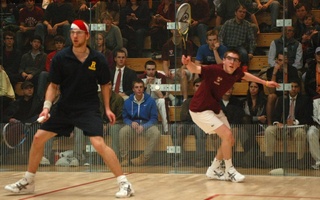
Sophomore Brandon McLaughlin, playing at the No. 2 spot for most of the season, helped the Harvard men’s squash team to a top-three finish at the CSA National Team Championships for the first time in five seasons. For his play, McLaughlin was named a second-team All-American. Sophomore Ali Farag earned an All-America First Team nod.
After dropping its semifinal matchup of the 2012 Potter Cup to 13-time defending national champion Trinity, the Harvard men’s squash team bounced back, taking down Cornell, 5-4, in the consolation final to claim the No. 3 spot in the nation.
And although the Crimson (16-4, 5-2 Ivy) fell in two of its first three individual matches against the Big Red, Harvard freshman Nick Hopcroft was able to muster a crucial fifth win at the No. 4 spot to lock in a victory for his team.
“As I was watching the match unfold, it became clear that mine would be the match,” Hopcroft says. “Somehow, I managed to win it. I’ve always wanted to play in a situation like that and win one for the team.”
“It was an incredible feeling,” Hopcroft continues. “It was a dogfight [against Cornell], but we came out on top.”
The win marked the Crimson’s first top-three finish at the CSA National Team Championships since 2007 and served as a fitting capstone for a solid season that began with an 11-game winning streak and featured exactly as many 9-0 wins.
“Our third-place finish was the best Harvard has done in many years, so we’re very pleased with the improvement that we’re showing,” Hopcroft says. “That said, we have bigger ambitions for next season. We’re determined to try to win the national title next year.”
Meanwhile, a team other than Trinity was crowned national champion for the first time since Harvard last won the title in 1998: Princeton. The Tigers took down the Bantams, 5-4, in the Potter Cup finals in Princeton, N.J., breaking the longest title streak in the history of intercollegiate sports.
Princeton had bested the Crimson by the same score on Jan. 15.
“At the beginning of the season, different people would show up to play on different days, but we never really got it going on the same day,” Hopcroft says. “Throughout the season, we struggled with that. We lost tight matches to Princeton and to Trinity, matches we could have won. But everyone came together at nationals…and we’re proud of the way we played.”
And despite halting Trinity’s 252-game winning streak on Jan. 18, Yale ended the year in the No. 5 slot nationally.
“I think that shows you just how close the teams were this year,” sophomore Gary Power says. “One of our goals coming into the season was to end that streak, but our bigger aim was to win the national championship.”
“[The season] was a good learning experience,” Power adds. “We’re an incredibly young team. We didn’t reach our full potential, but I’m confident we’ll be in a good position next year.”
Harvard—seeded fourth in the eight-team national championship field—kicked off the tournament with a 6-3 win against a Rochester team seeking retribution after being upset by the Crimson during the regular season. But Harvard came to play against the Yellowjackets, securing a trip to the semifinals after just six individual matches had been played.
Trinity clinched the semifinal matchup between the two teams in a similar fashion, taking all three second-cycle matches and tallying a win—and a trip to the finals—after the first six.
The loss was the Crimson’s second to the Bantams in 2012, as Trinity bounced back from its only regular season loss to dismantle the Harvard, 7-2, on Jan. 21.
Read more in Sports
MEN'S LACROSSE: Trio of Losses to End Year Dooms Postseason Hopes


















